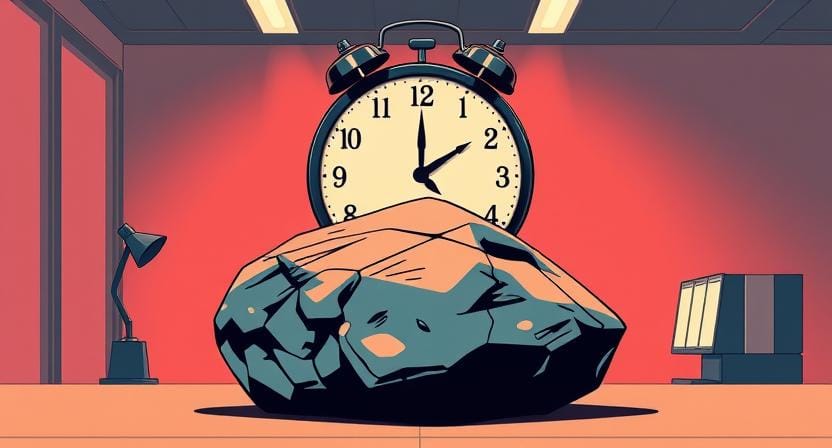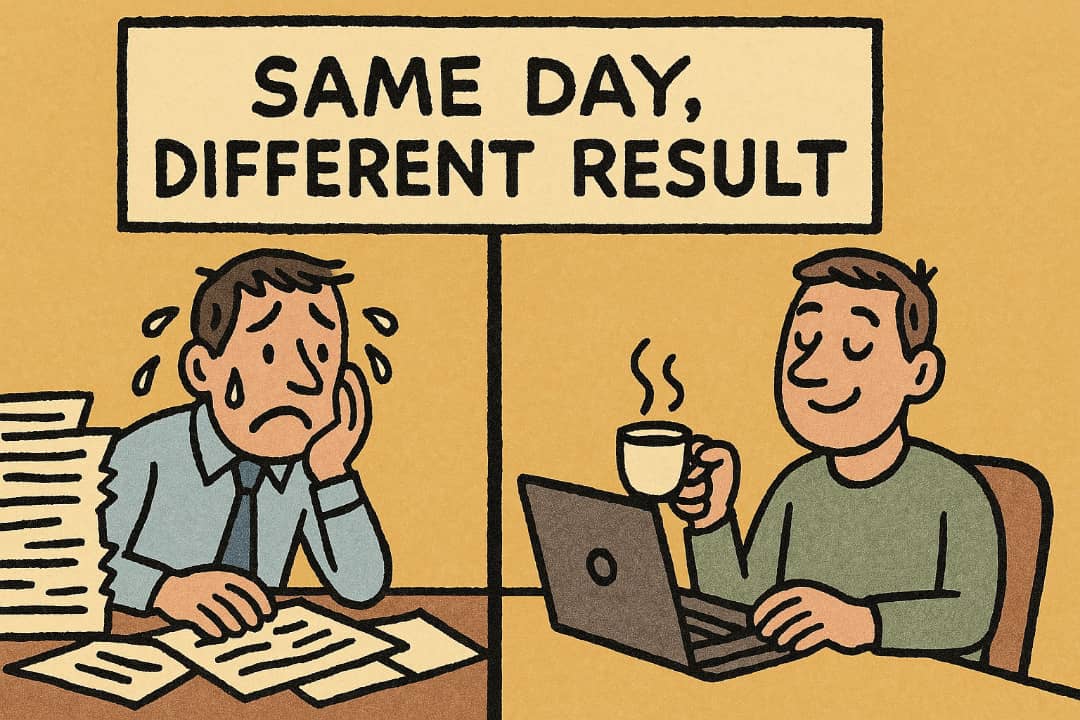Work Smarter
The Secret to Getting More Done in Less Time

Work Smarter
How Working Less Can Make You Earn More

Some people work from morning till night but still no money left. Others do small work but earn more and still rest well. This thing makes many people confused. The truth is, working more hours does not always mean you will make more money. There are reasons why working less can bring more money. It depends on the kind of work, how you use your time, your skill, and how your mind works. You can earn well without killing yourself with stress. But it is not magic. You need to understand the process.
One reason why working less can make you more money is focus. When you work too many hours every day, you can get tired easily. When the body is tired, the brain will not think well. But when you work less and rest more, your brain will become sharp. When your brain is sharp, you will make better decisions. Good decisions help you work smarter, not harder. Smart work brings better results than too much effort.
Another reason is skill value. Some jobs pay you for your time. If you are not working, you are not earning. But some jobs pay you for your knowledge or skill. For example, if you know how to design websites, teach people, write books, or build apps, you can earn good money even if you work just a few hours a day. People pay more for valuable skill than for manual labour. If you improve your skill, you can charge higher and work less.
Passive income also makes working less possible. Passive income means money that continues to come even when you are not working at that time. For example, if you sell an eBook, people can buy it any time of the day or night. If you have a YouTube channel or blog that brings in money from adverts, you can be sleeping while your content is making money for you. If you invest in shares or real estate, the returns can come without daily work. These kinds of income give you time to rest and still earn.
Time management is another part. Some people use their whole day to do different work but earn small because they are not organised. Others use just a few hours well and get bigger results. For example, if you spend two hours daily replying to email, going up and down, and doing small small tasks, it can eat all your time. But if you use tools like auto-responders or batch your tasks together, you can save time. That saved time can go into work that brings money. When you reduce waste of time, you increase value of your time.
There is also something called opportunity cost. If you use all your energy to do one thing, you may miss other chances. Let us say you are doing two low-paying jobs every day, morning till night. That work blocks you from learning a better skill or starting your own business. When you work less, you can have time to study, plan, or try something new that can grow your income. The little time you save today can bring better future tomorrow.
Some people also earn more because they charge for results, not time. For example, a digital marketer can help a company get new customers and charge based on the number of sales. If they do the work in one hour and it brings in $100,000, they can charge a good amount. But if you are paid by hour, you may work long and still earn less. So, when you start charging based on result, not time, you will work less and earn better.
Freelancers and consultants use this model. Instead of working under someone and collecting salary every month, they take special projects. Some projects can take just 10 hours, but the money is big. They plan their time and choose only the work that gives good return. If they accept too much work, they will not do well and may lose clients. That is why many of them work less to focus well and produce quality.
People who work less and earn more also use systems. A system is something that continues working without your full attention. It can be a team, a process, or a tool. For example, if you run an online store and you use delivery partners, customer support, and payment platforms, you do not have to be there every minute. The system runs the work. You check results, improve things, and keep moving. That is how business owners grow rich. They are not doing everything by hand.
Some also reduce their work time by delegating. Delegation means giving part of your work to others. You pay them small and focus on the work that brings in the most money. For example, if you are a graphic designer and you have a junior designer who helps with small tasks, you can do more high-paying jobs while your assistant handles the small ones. This way, you work fewer hours but get better income.
It is also important to say that health affects money. If you are always stressed, tired, or sick because of long hours, you may stop work at some point. That loss of time and strength can affect your money. But when you work less, eat well, rest, and take care of your body, you stay active longer. Long-term health can help you earn more over time. The money you get from too much work can end up going into hospital bills.
One major thing to note is that working less and earning more does not happen by accident. You need to plan it. You need to check what you are doing now and where the problem is. Are you doing low-value work? Are you charging too small? Are you wasting time on things that do not bring income? These questions will help you see what to stop and what to improve. The more you plan, the more you grow.
Another thing to look at is the digital economy. Today, many people make money online. Some sell products, some offer services, and some run platforms. They do not need to be in office. They use tools like Zoom, Canva, ChatGPT, email, and others. With good internet and laptop or phone, they work from home and earn from people around the world. This work model gives freedom and higher income in less time. But it takes time to learn and set up.
Automation helps also. If you run an online shop, you can use chatbots to answer customers. You can use accounting software to track money. You can use email tools to reach people without sending messages one by one. These tools remove stress and free your time. Instead of spending 8 hours doing small things, you spend 2 hours doing big things. That is the value of automation.
You must also learn to say no. Not every job is good for you. If someone brings low-paying job that will take your whole day, it is okay to reject it. When you say no to wrong jobs, you have time for the right ones. This habit helps you grow your income in the long run.
Some people start earning more by creating digital products. These are things like online courses, eBooks, templates, and design files. You create them once, and sell them many times. No need to work every time someone pays. The more people buy, the more you earn. If you already have a skill, you can turn it into a product. This method saves time and still gives good money.
You can also look into affiliate marketing. That is when you help promote other people’s product and you get a small share from every sale. You do not own the product. You only share the link or talk about it. If many people buy through your link, your money increases. Some people earn daily from this without doing customer service or delivery.
One final thing is building a personal brand. When people trust your name, they will pay you more. You can charge higher than others. You can choose your work hours. You can work less and earn more. To build your name, you must do good work, stay consistent, and be known for quality. Over time, your name will speak for you.
All these points show that working less can lead to more income. But it requires planning, skill, tools, and right mindset. If you continue doing hard labour from morning to night without thinking of better methods, your income may remain low. But if you learn to work smart, rest well, and focus on high-value work, your money can grow while your stress reduces.
Work Smarter
Why Working Hard Might Be Holding You Back

How to Stop Working Hard and Start Working Smart
Let’s be honest: the whole “hustle hard” mantra is a scam. We’ve been conditioned to think that the more hours we grind, the more results we’ll see. But here’s the harsh truth: working harder doesn’t always equate to better outcomes. In fact, working too hard often leads to burnout, poor decisions, and a complete loss of sanity. It’s time to get off the hamster wheel.
The real question isn’t, “How much are you working?” It’s, “Are you working on the right things, in the right way?”
Smart work isn’t about how many hours you put in. It’s about focusing on the few things that matter most and cutting out the noise. And I’m not talking about fluffy motivational nonsense. I’m talking about real, actionable strategies that will let you make more progress in less time.
Here’s how you stop working hard and start working smart.
1. Stop Chasing Busy Work
First off, stop filling your day with random tasks that don’t move the needle. We’ve all been there—checking off to-do lists that make us feel productive, but when we look back at the end of the day, we realize we didn’t actually accomplish anything meaningful. You’ve got to stop fooling yourself into thinking that just because you’re busy, you’re making progress.
Identify the tasks that are truly impactful—the ones that bring you closer to your goals, that move your business, career, or personal life forward. Cut out the fluff. That meeting you don’t need to be in? Skip it. The extra emails you’re answering just to be “helpful”? Stop. The endless scrolling on social media? Get a grip.
The 80/20 Rule (also known as the Pareto Principle) is your friend here. Focus on the 20% of activities that will give you 80% of the results. Everything else is filler.
How to Apply It:
- List your tasks for the day. Next to each, ask yourself: “Does this move me toward my big goal?” If not, ditch it.
- Delegate. If someone else can do it (and they’re better at it), pass it off.
- Automate repetitive tasks wherever possible. Tools like scheduling apps or email filters exist for a reason.
The goal is to clear your calendar of everything that isn’t contributing to your larger objectives. Every minute you spend on “busy work” is a minute you’re not investing in what truly matters.
2. Master the Art of Saying No
Here’s a skill you probably suck at: saying no. Whether it’s more work being piled on your desk or people demanding your time for unnecessary reasons, saying yes to everything is a quick way to burn out.
The problem is, most people want to be seen as helpful, likeable, or indispensable. So we say yes to every project, every request, every favor. But this is a fast track to mediocrity and exhaustion. Saying yes to everything means you’re just spreading yourself thin without making significant progress on the important things.
Get comfortable with saying no. It’s a powerful tool for taking back your time and focus. If something doesn’t align with your goals or priorities, don’t hesitate to turn it down. People will respect you more for it in the long run—because they’ll see that you’re intentional with your time.
How to Do It:
- Practice saying no in low-stakes situations. You don’t have to be rude, but get used to the idea of not overcommitting.
- If you don’t have the bandwidth, simply say, “I don’t have the capacity right now.”
- Refocus your energy on the projects or opportunities that directly contribute to your growth.
By saying no more often, you’re not just preserving your sanity—you’re guarding your time like the precious resource it is.
3. Leverage Your Strengths, Not Your Weaknesses
Most people work hard because they’re focused on fixing their weaknesses. They think that if they just improve on what they suck at, they’ll magically become more successful. But here’s the kicker: trying to be good at everything is a waste of time. You’ll never be great at things that don’t come naturally to you, and even if you do get “better,” you’re just going to be a mediocre version of something you don’t care about.
Smart workers don’t spend their time grinding on their weaknesses. They double down on their strengths.
This doesn’t mean you should completely ignore areas of improvement, but your energy and resources are better spent amplifying what you’re already good at. If you’re an excellent communicator, use that to your advantage. If you’re good with data, find ways to leverage that skill in your career. Work smarter by focusing on what makes you unique and outstanding.
How to Do It:
- Identify your top three strengths. These are the skills that give you the highest return on investment.
- Find ways to apply these strengths more frequently in your work.
- Look for opportunities to outsource or delegate tasks that fall outside of your strengths.
By focusing on what you do best, you’ll automatically improve your results without needing to work harder.
4. Create Systems That Run Without You
One of the smartest things you can do is build systems that make your life easier. When you work harder, it’s often because you’re re-inventing the wheel every single day. You’re tackling the same problems, doing the same tasks, and putting out the same fires over and over again. But you don’t have to live this way. Systems and processes are your ticket out of the grind.
Take a look at your daily tasks and ask, “How can I make this happen without having to think about it every time?” Can you automate it? Can you delegate it? Can you create a repeatable process?
When you set up systems, you’re working smarter—not harder. The work becomes more efficient, and you have more mental space to focus on the important things.
How to Do It:
- Create checklists or templates for tasks you do frequently. These make the work faster and less stressful.
- Use apps and software to automate repetitive tasks—email follow-ups, social media posts, invoicing, etc.
- If you’re running a business, create SOPs (Standard Operating Procedures) so everything can be done even if you’re not around.
When you remove the manual labor from your day-to-day, you can focus on the things that require your creativity and expertise.
5. Take Strategic Breaks
Working harder doesn’t mean you should work non-stop. In fact, working too much without breaks actually makes you less productive in the long run. You need to reset your brain regularly to avoid fatigue and burnout.
Smart workers understand the power of taking strategic breaks. It might sound counterintuitive, but taking time to rest, recharge, and step away from your work actually increases your productivity.
How to Do It:
- Take short breaks every 60 to 90 minutes to refresh your mind. This can be as simple as a five-minute walk or a quick stretching session.
- Practice the Pomodoro Technique: work for 25 minutes, then take a 5-minute break.
- Don’t feel guilty about resting. The more refreshed you are, the more you can accomplish when you get back to work.
Remember, your brain needs time to rest and recover in order to be sharp and focused. Stop pretending that working non-stop will make you a productivity god. It’s just a recipe for exhaustion.
6. Work Less, Think More
Here’s the thing: you don’t need to be hustling all the time. In fact, thinking is the secret to working smart. Taking the time to reflect, plan, and strategize will save you more time and energy in the long run than constantly being in “doing” mode.
Smart workers take time to think about the big picture. They assess, analyze, and make decisions based on the most effective path forward—rather than just reacting to whatever’s in front of them.
How to Do It:
- Schedule “thinking time” into your calendar. Block out time each day to plan, reflect, and review your goals.
- Don’t rush decisions. Take your time to evaluate your options and think through the consequences.
- Ask yourself regularly, “Am I working on the right things?” and course-correct as needed.
Thinking more will not only save you time—it’ll help you work smarter, not harder.

 Digital Hustle5 months ago
Digital Hustle5 months agoHow to Make Real Money Online Using Simple Ways

 Money Moves5 months ago
Money Moves5 months agoHow to Avoid Bank Account Problems

 Stay Human5 months ago
Stay Human5 months agoHow to Know If You Are Losing Your Human Side

 Money Moves5 months ago
Money Moves5 months agoSimple Ways to Make Money the Honest Way

 Money Moves5 months ago
Money Moves5 months agoHow to Make Money Without Stress

 Local Genius Spotlight5 months ago
Local Genius Spotlight5 months agoSimple Steps That Made Ian Williams a Leader

 Local Genius Spotlight5 months ago
Local Genius Spotlight5 months agoWays Small Entrepreneurs Grow from Nothing

 Money Moves5 months ago
Money Moves5 months agoWays Small Business Loan Can Grow Your Work







































